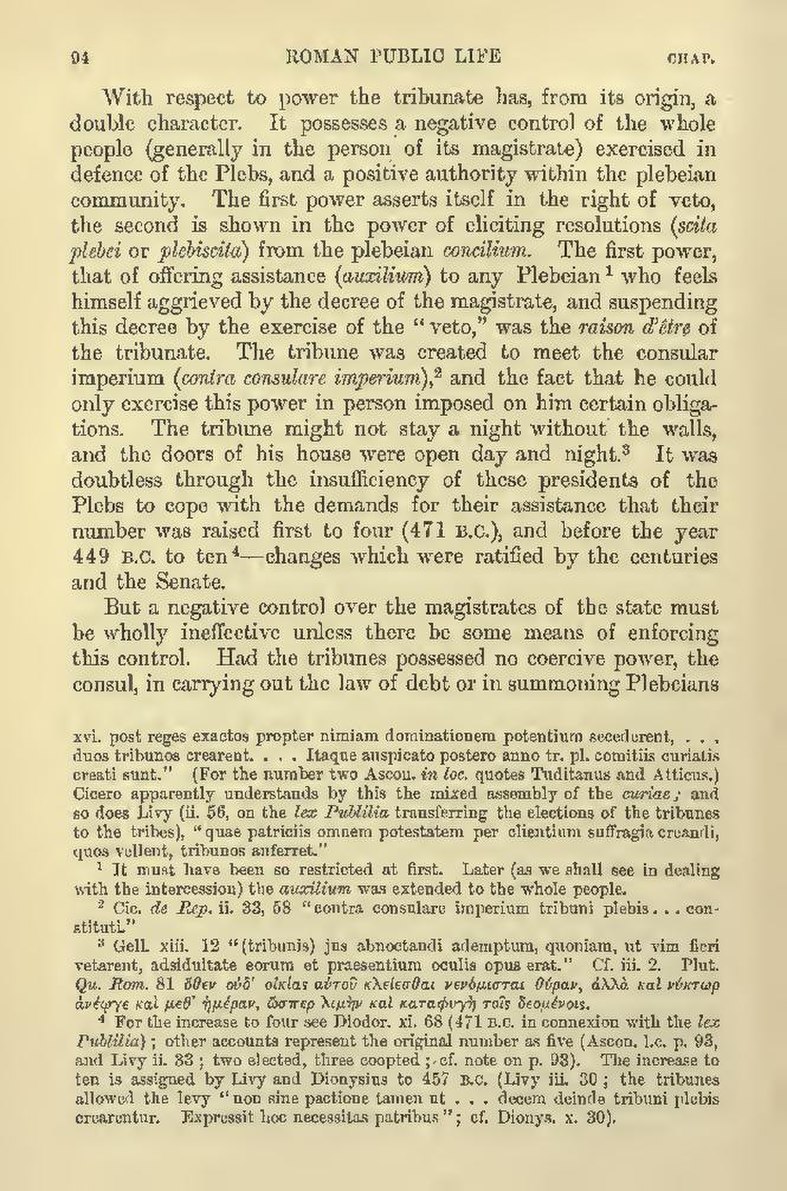With respect to power the tribunate has, from its origin, a double character. It possesses a negative control of the whole people (generally in the person of its magistrate) exercised in defence of the Plebs, and a positive authority within the plebeian community. The first power asserts itself in the right of veto, the second is shown in the power of eliciting resolutions (scita plebei or plebiscita) from the plebeian concilium. The first power, that of offering assistance (auxilium) to any Plebeian[1] who feels himself aggrieved by the decree of the magistrate, and suspending this decree by the exercise of the "veto," was the raison d'être of the tribunate. The tribune was created to meet the consular imperium (contra consulare imperium),[2] and the fact that he could only exercise this power in person imposed on him certain obligations. The tribune might not stay a night without the walls, and the doors of his house were open day and night.[3] It was doubtless through the insufficiency of these presidents of the Plebs to cope with the demands for their assistance that their number was raised first to four (471 B.C.), and before the year 449 B.C. to ten[4]—changes which were ratified by the centuries and the Senate.
But a negative control over the magistrates of the state must be wholly ineffective unless there be some means of enforcing this control. Had the tribunes possessed no coercive power, the consul, in carrying out the law of debt or in summoning Plebeians
- [Footnote: xvi. post reges exactos propter nimiam dominationem potentium secederent, . . .
duos tribunos crearent. . . . Itaque auspicato postero anno tr. pl. comitiis curiatis creati sunt," (For the number two Ascon. in loc. quotes Tuditanus and Atticus.) Cicero apparently understands by this the mixed assembly of the curiae; and so does Livy (ii. 56, on the lex Publilia transferring the elections of the tribunes to the tribes), "quae patriciis omnem potestatem per clientium suffragia creandi, quos vellent, tribunos auferret."].]
- ↑ It must have been so restricted at first. Later (as we shall see in dealing with the intercession) the auxilium was extended to the whole people.
- ↑ Cic. de Rep. ii. 33, 58 "contra consulare imperium tribuni plebis . . . constituti."
- ↑ Gell. xiii. 12 "(tribunis) jus abnoctandi ademptum, quoniam, ut vim fieri vetarent, adsiduitate eorum et praesentium oculis opus erat." Cf. iii. 2. Plut. Qu. Rom. 81 [Greek: hothen oud' oikias autou kleiesthai nenomistai thyran, alla kai nyktôr aneôge kai meth' hêmeran, ôsper limên kai kataphygê tois deomenois
- ↑ For the increase to four see Diodor. xi. 68 (471 B.C. in connexion with the lex Publilia); other accounts represent the original number as five (Ascon. l.c. p. 93, and Livy ii. 33; two elected, three coopted; cf. note on p. 93). The increase to ten is assigned by Livy and Dionysius to 457 B.C. (Livy iii. 30; the tribunes allowed the levy "non sine pactione tamen ut . . . decem deinde tribuni plebis crearentur. Expressit hoc necessitas patribus"; cf. Dionys. x. 30).
